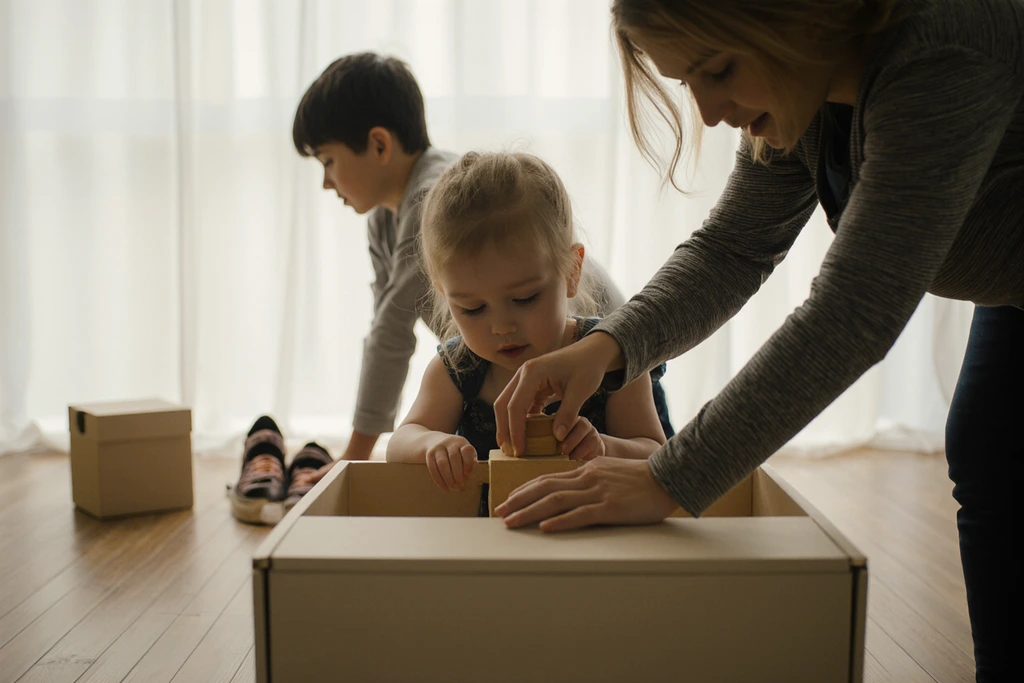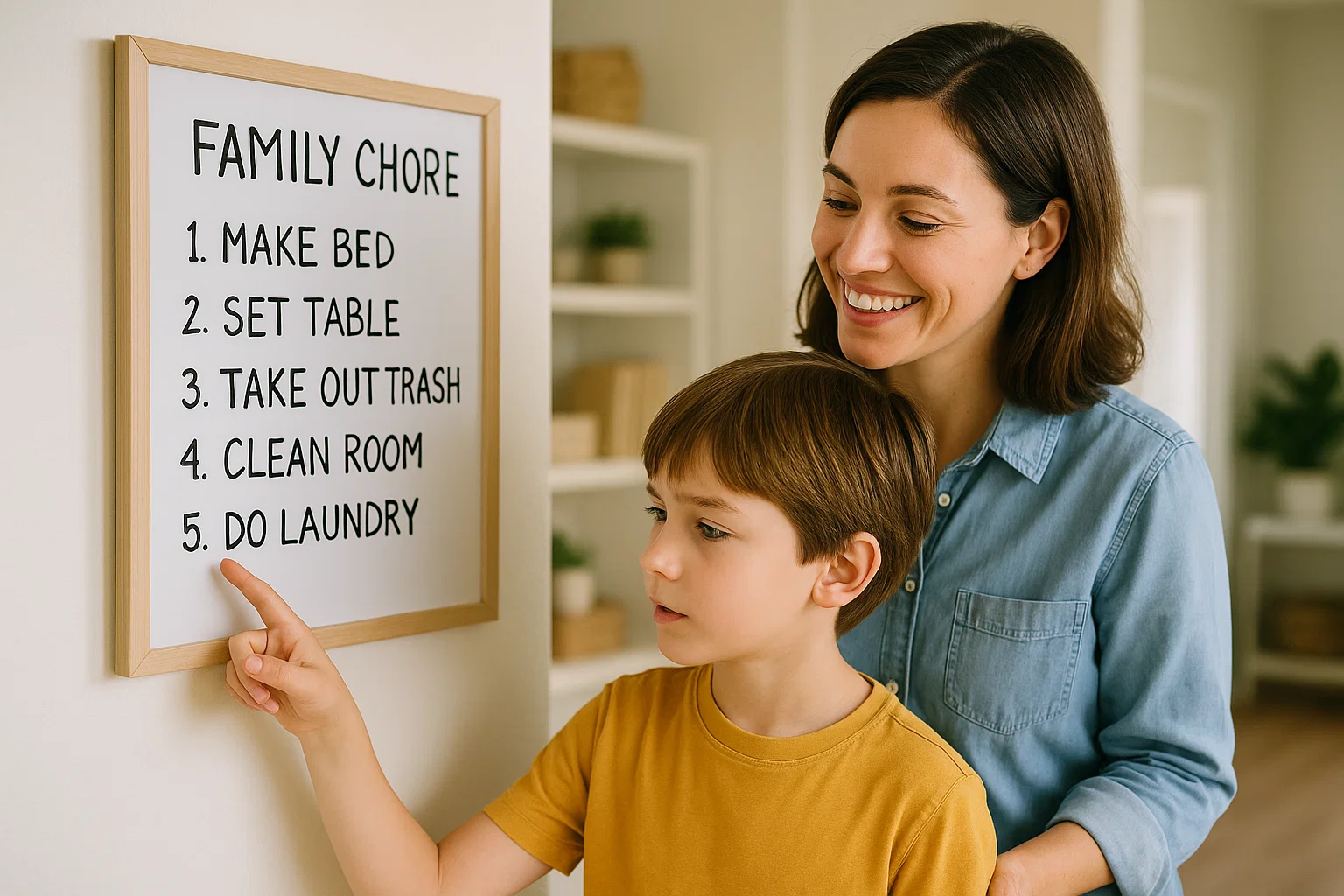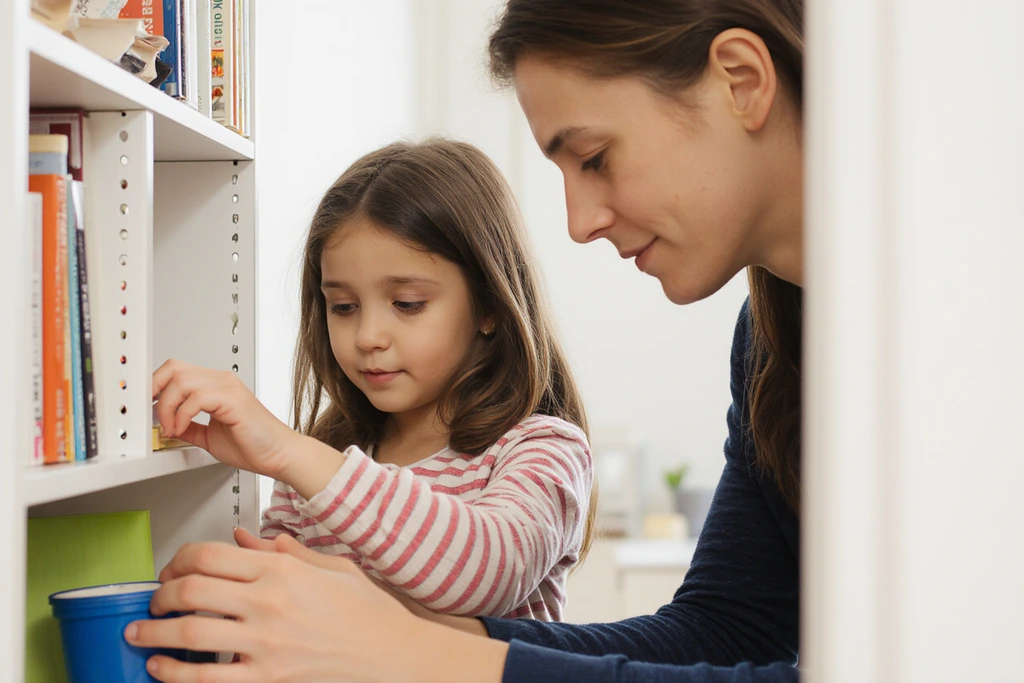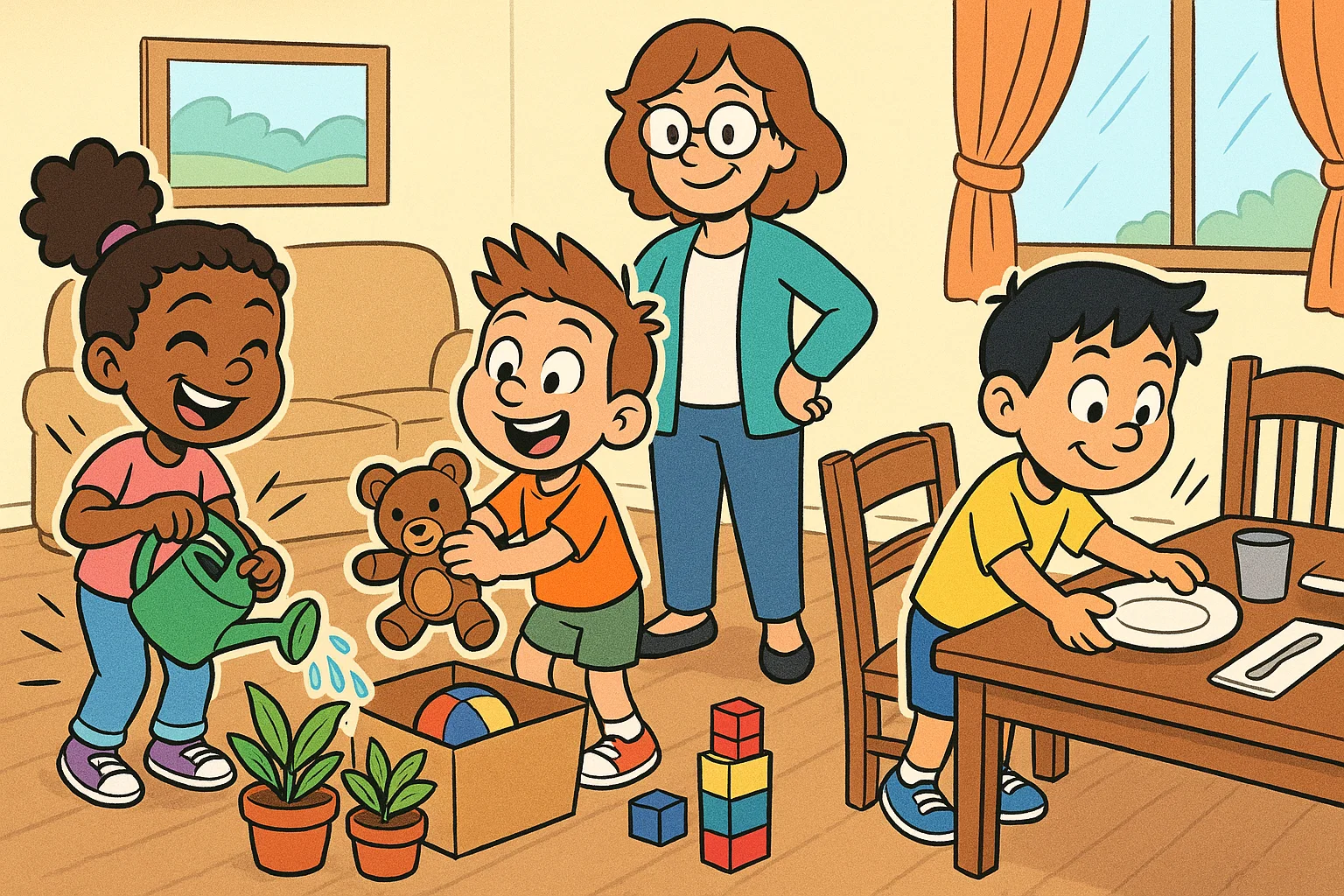Teaching children responsibility represents one of the most valuable gifts you can give them as a parent. This essential life skill shapes how your kid approaches challenges, relationships, and personal growth throughout their lifetime. When you help your kid develop accountability, you’re not just managing behavior—you’re building character that will serve them well into adulthood.
Why Responsibility Matters for Kids?
Understanding the importance of responsibility helps you approach this teaching process with clarity and purpose. Research consistently shows that children who learn accountability early demonstrate better academic performance, stronger relationships, and improved emotional regulation.
Building Life Skills
Responsibility forms the foundation for countless practical abilities your child will need throughout life. When you teach it, you’re helping them develop problem-solving skills, time management, and decision-making capabilities. These skills transfer directly to academic success, where students who can manage their assignments and commitments consistently outperform their peers.
A study by the American Psychological Association found that children who regularly complete age-appropriate tasks show 23% better performance in executive functioning skills compared to those who don’t have consistent responsibilities. This improvement affects everything from following multi-step directions to managing emotions during challenging situations.
Fostering Independence
Teaching responsibility naturally builds your child’s confidence and self-reliance. When kids learn to handle tasks independently, they develop what psychologists call “mastery orientation”—the belief that they can learn and improve through effort. This mindset proves crucial for navigating life’s inevitable challenges.
Research from Cebu Normal University on Diana Baumrind’s parenting styles indicates that children who receive consistent responsibility training show greater emotional maturity and social competence. They learn to trust their own judgment while understanding how their actions affect others.
Start Teaching Early

The optimal time to begin responsibility training is earlier than most parents realize. Even toddlers can begin learning basic accountability through simple, age-appropriate expectations.
Age-Appropriate Tasks
Matching tasks to your child’s developmental stage ensures success while building confidence. Here’s how you can structure responsibilities across different ages:
| Age Range | Appropriate Tasks | Key Focus |
| 2-3 years | Put toys away, carry light items | Following simple directions |
| 4-5 years | Set table, feed pets, organize backpack | Building routines |
| 6-8 years | Pack lunch, manage homework folder | Personal organization |
| 9-12 years | Laundry sorting, meal prep assistance | Household contribution |
| 13+ years | Budget management, job responsibilities | Real-world preparation |
Building Foundations
Early responsibility training focuses on consistency rather than complexity. When you establish predictable expectations, your child learns that accountability is simply part of daily life, not an additional burden. Start with one or two clear expectations that your kid can easily master before adding new responsibilities.
Research from the University of Minnesota’s longitudinal study shows that children who begin responsibility training before age four demonstrate significantly better self-regulation skills throughout adolescence. The key lies in making these early experiences positive and achievable.
Set Clear Expectations

Ambiguous instructions lead to frustration for both parent and child. Clear, specific expectations help your kid understand exactly what responsibility means in practical terms.
Define Responsibilities
Effective responsibility teaching requires precision in your communication. Instead of saying “be responsible with your things,” try “put your backpack in the designated spot when you come home, and check that your homework folder is inside.” This specificity helps your child understand the exact action you expect.
Create visual reminders for younger children. A simple checklist with pictures can help a six-year-old remember their morning routine without constant parental reminders. This approach builds independence while maintaining clear boundaries.
Use Direct Language
Your word choice significantly impacts how your kid receives and processes expectations. Use positive, action-oriented language that focuses on what you want them to do rather than what you want them to avoid. “Please put your dishes in the dishwasher after eating” works better than “don’t leave your dishes on the table.”
Dr. Alfie Kohn’s research on motivation suggests that children respond more positively to expectations framed as contributions to family life rather than arbitrary rules. This framing helps kids understand that their responsibility matters to others, not just to avoid punishment.
Be a Role Model 👨👩👧👦

Children learn more from what they observe than from what they hear. Your daily actions provide constant lessons about accountability and responsibility.
Demonstrate Accountable Actions
When you make mistakes, own them openly. If you forget to pick up groceries for dinner, acknowledge the oversight and explain how you’ll handle the situation. This transparency teaches your kid that responsibility includes accepting mistakes and finding solutions.
Model the problem-solving process aloud. When facing a challenge, verbalize how you approach it: “I need to figure out how to manage my time better this week. Let me look at my calendar and see where I can make adjustments.” This demonstration shows your child that responsibility is an ongoing process, not perfection.
Narrate Your Decisions
Help your kid understand the thinking behind responsible choices by explaining your decision-making process. When you choose to prepare for a meeting the night before, explain how this preparation helps you feel confident and reduces stress the next day.
This narration technique, helps children develop internal reasoning skills they can apply to their own choices. They begin to understand that responsible actions often involve short-term effort for long-term benefits.
Teach and Coach
Moving beyond simple instruction to active coaching helps your child develop genuine competence and confidence in handling responsibilities.
Guide, Don’t Just Tell
Effective responsibility teaching involves working alongside your child initially, then gradually reducing your involvement as they demonstrate competence. This scaffolding approach, developed by educational psychologist Lev Vygotsky, ensures your kid develops genuine understanding rather than mere compliance.
When teaching your kid to manage their homework routine, start by sitting together and organizing the process. Discuss how to prioritize assignments, estimate time requirements, and create a comfortable workspace. Over time, transition to check-ins rather than direct supervision.
Break Down Tasks
Complex responsibilities can overwhelm children, leading to avoidance or incomplete efforts. Breaking large tasks into smaller, manageable steps helps your child experience success while building skills systematically.
For example, “keeping your room clean” might break down into: make your bed each morning, put dirty clothes in the hamper daily, spend ten minutes each evening putting items back in their designated places, and do a more thorough organization once weekly. This approach makes the responsibility feel achievable rather than overwhelming.
Implement Consequences and Rewards
Effective accountability systems help children understand the connection between their choices and outcomes while building intrinsic motivation for responsible behavior.
Natural Consequences
Natural consequences occur automatically as a result of a child’s choices, requiring no parental intervention. When your kid forgets their lunch, they experience hunger. When they don’t complete homework, they face their teacher’s response. These experiences provide powerful learning opportunities without parental lectures.
The key is allowing these consequences to occur while providing emotional support and problem-solving guidance.
Logical Consequences
When natural consequences aren’t sufficient or safe, logical consequences provide clear connections between choices and outcomes. If your kid doesn’t complete their chores, they lose access to privileges that depend on family cooperation, such as screen time or social activities.
The most effective logical consequences focus on helping your child make better choices next time rather than simply imposing discomfort. Positive reinforcement remains important for building responsibility. Acknowledge your child’s efforts and improvements, focusing on specific behaviors rather than general praise. “I noticed you remembered to feed the dog every day this week without reminders” provides more valuable feedback than “good job being responsible.”
Frequently Asked Questions (FAQ)
It’s a common challenge. While children, especially at a young age, often need a reminder, the goal is to build their internal motivation. Instead of nagging, which can lead to them tuning you out, try using visual charts or a set time each day for tasks. This helps to reinforce the routine without constant verbal cues. The objective is to teach a child to manage their own tasks, which is a key part of learning personal responsibility.
Children develop responsibility through consistent routines, clear expectations, and age-appropriate tasks that encourage independent decision-making. Regular feedback from adults strengthens accountability and helps build reliable habits over time.
For a preschool child, the best tips for teaching involve simple, concrete tasks. You can assign them jobs like putting their toys in a bin after playtime, placing their dirty towel in the hamper, or helping to clear the table by carrying their own napkin to the trash. The key is consistency. These small actions around the house build a foundational sense of responsibility from a very early age.
This is a popular strategy, but it requires a thoughtful approach. Many experts suggest separating a basic allowance, which teaches money management, from core household contributions. You want to encourage your children to help clean and contribute because they are part of the family, not just because they are getting paid. You could tie payment to extra jobs that go beyond their standard responsibilities, but basic tasks like “make your bed” or “keep your room tidy” should be expected.
First, avoid labeling your child as “irresponsible.” Instead, focus on the behavior. Have a calm conversation and make sure your expectations are clear. “Clean your room” can be overwhelming; break it down into specific tasks like “put away your books” or “fold your clean clothes.” Frame discipline as a teaching moment. If they fail to complete the task, use a logical consequence, like losing privileges, rather than getting into a power struggle. Don’t demand perfection, but don’t accept an excuse without a plan for them to complete the job well.
This is one of the most significant benefits! When you teach your child to handle age-appropriate tasks, you empower them. As they learn to take on challenges and see that they can do a job well, their confidence and self-esteem grow. This has a profoundly positive impact on their overall mental health. They see themselves as capable and begin to develop a strong sense of responsibility for their own actions and contributions.
The goal is to foster cooperation, not conflict. One of the best ways to teach this is by framing chores as a family contribution. Instead of just telling them to do something, explain why it helps everyone. For example, “When you clear the table, it helps me get the kitchen clean faster so we can all relax.” As they get older, involve them in creating the chore schedule. When children to take part in the decision-making process, they feel more ownership and are more likely to become more responsible without pushback.


